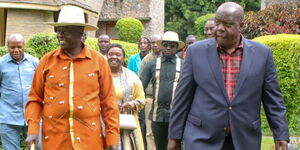The much-anticipated August 9 election is fast-approaching, with days to the ballot. The elections will usher in a new era in the succession of President Uhuru Kenyatta whose 10-year constitutional tenure is ending.
However, the same constitution does not envisage a vacuum in power, and as such, some scenarios could see president Uhuru remain in office to at least November 27.
In the normal aftermath of the election, the president-elect as declared by the Independent Electoral and Boundaries Commission - IEBC, would be sworn-in on September 6.
However, if the election does not have a winner as provided for in the constitution, the change of guard could be delayed for at least two months.
The first such complication could be the event where neither of the four candidates secures the requisite more than 50% of the total votes required to secure a first-round win.
This would necessitate a runoff to be held within 30 days.
Going by the recent opinion polls on the most preferred presidential candidate, the outcome is not likely to provide a winner in the first round.
A poll by Infotrak released on Tuesday, August 2, for example, predicted that the most popular candidate has an approval rating of 49 percent with the second one enjoying 42 percent support.
The tight nature of the contest could also see the outcome of the results challenged through a petition.
A Supreme Court could delay the transition of power at least until mid-September if the court gives a verdict upholding the results of the IEBC.
According to the constitution, the latest day an aggrieved candidate can file a petition is August 23.
The Supreme Court is further given a maximum of 14 days to listen to submissions and deliver a verdict, which could extend the wait to September 13.
Nullification of the results would imply that the country would be forced to go back to the ballot after sixty days. The tentative date of a repeat, in this case, would be at least November.
The outcome of the election, at this stage, would still be challenged by either party.
During the landmark decision of the Supreme Court in 2017, then Chief Justice David Maraga maintained that the court would not hesitate to nullify the repeat election if the issues raised in the petition were not addressed.
A call for fresh elections could see Kenya cross over to 2023 with President Uhuru still sitting as the President under temporary incumbency.












